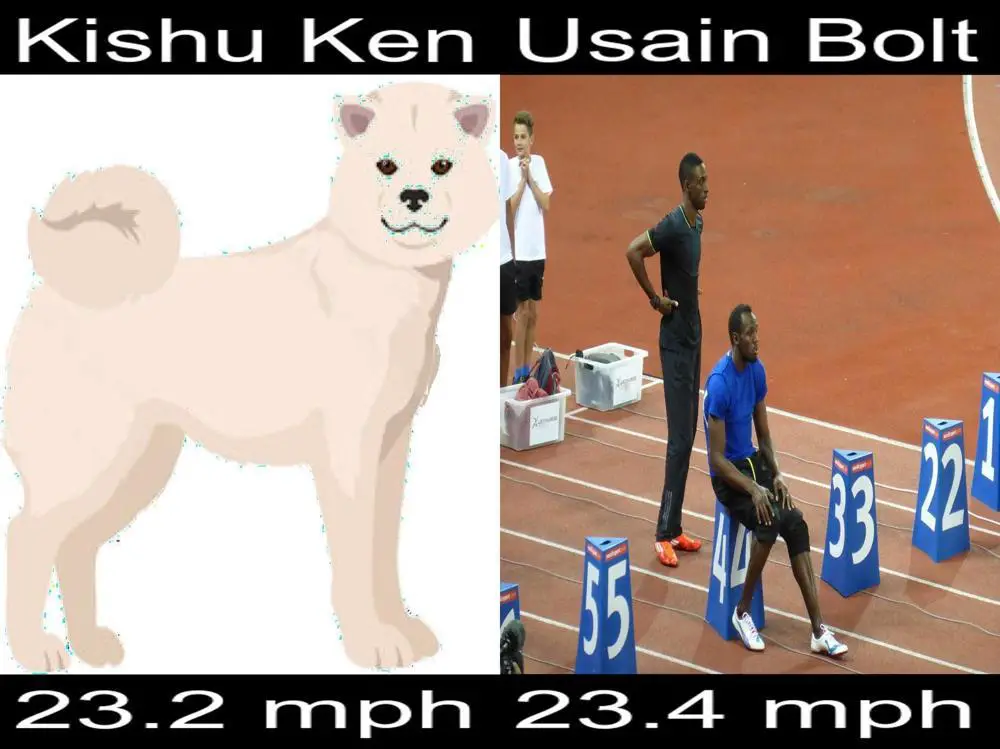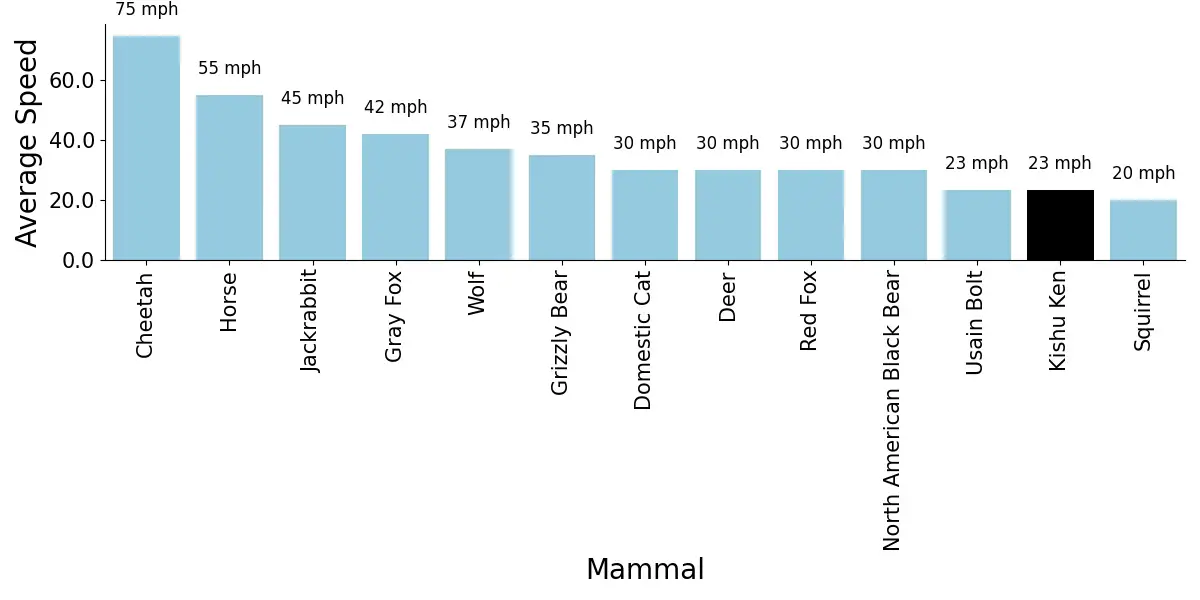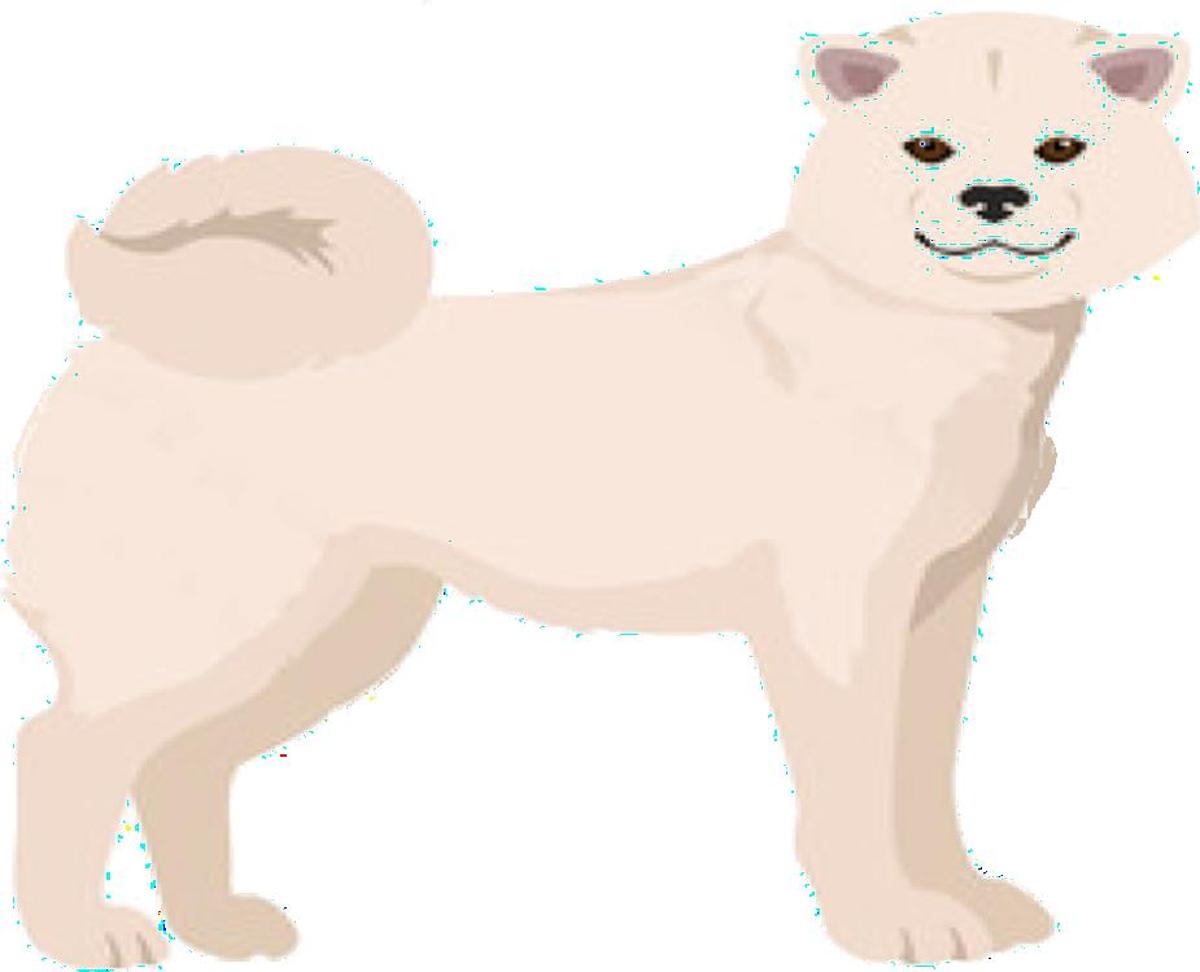Quick Links: Table of Contents
- Kishu Ken Breed Overview
- History of the Kishu Ken Breed. Where Kishu Kens came from
- What the Kishu Ken Looks Like
- What Colors do Kishu Kens Have?
- How Long Kishu Kens Live
- How Fast Kishu Kens Can Run
- Health Problems in Kishu Kens and How to Prevent Them
- Dog Breeds That Are Similar to Kishu Kens
- Other Things to Know About Kishu Kens
Kishu Ken Breed Overview
The Kishu Ken is a medium-sized dog.
The adult Kishu Ken stands 17 to 22 inches.
The Kishu Ken belongs to the Working Dogs group.
Dogs in the Working Dogs group, like the Kishu Ken, were developed to assist humans in some capacity – including pulling sleds and carts, guarding flocks, guarding homes, and protecting their families.
Breeds in the Working Group are known for their imposing stature, strength, intelligence, and fearless.
Because of their size and strength, working dogs require a structured home life and firm, fair, consistent training by someone who can provide leadership without resorting to anger or physical force.
The fact that Kishu Kens belong to the Working Dogs group is one of the reasons why Kishu Kens have the personality and temperament that they have.
The temperament of the Kishu Ken is generally described as:
- Alert
- Dignified
- Docile
- Faithful
- Noble
History of the Kishu Ken Breed. Where Kishu Kens came from
The Kishu Ken’s exact date of origin is unknown but many researchers believe that he dates back about 3,000 years or even longer.
Since most Japanese dogs do not have their history written down, it is impossible to say exactly when a breed was developed.
It is known that he did originate in the mountainous region of Kyushu, which is located off the mainland of Japan on the southernmost island.
He was bred to hunt wild boar, deer and even bear.
His job was to track the prey and then hold it until the hunter could catch up.
In some regions the Kishu Ken is still used to hunt wild boar, but he is mainly kept as a pet.
All Japanese breeds at one time were considered to be one breed and were only separated by their location and their size.
The Kishu Ken and Shikoku Ken, both of similar size and region were many times crossbred and thought to be purebred because the Japanese saw all their dogs as being the same.
Today, all Japanese dogs are closely related with the exception of the Hokkaido Ken who was isolated from the rest of Japan.
The Kishu Ken is also called the Kishu Inu.
The words ken and inu both mean dog in Japanese.
He is extremely rare outside of Japan and has been on the Japanese Protected Species list since 1934.
It is very difficult to import a Kishu Ken from Japan into other countries.
Even though it is difficult to export him from Japan, there is enough living within the United States to have enthusiasts of the breed petition the American Kennel Club (AKC) to register the Kishu Ken in their Foundation Stock Service.
.
What the Kishu Ken Looks Like
The Kishu Ken is a medium-sized, well-muscled dog.
He is similar to his cousins the Shiba Inu, Akita Inu, and Hokkaido Ken.
His eyes are almond-shaped, dark brown, and alert.
He has small triangular ears that stand up on top of his head and are slanted forward slightly.
His rims of his eyes, nose, and lips are all black.
He has the potential to have a brown nose.
The Kishu Ken is distinguished by his broad head that tapers to a blunt muzzle.
His bite can be level or scissors, but it can never be undershot.
In typical spitz fashion, his tail will curl over his back.
The Kishu Ken has a dense course coat that is short and straight.
.
What Colors do Kishu Kens Have?
Kishu Kens come in the following beautiful primary colors:
Kishu Kens come in the following lovely secondary colors in addition to their primary colors:
How Long Kishu Kens Live
The lifespan of the Kishu Ken is typically from 9 to 13 years.
Kishu Kens live long if they eat well, drink well, exercise well, and visit the veterinarian regularly.
How Fast Kishu Kens Can Run

How fast a dog breed can run is a good measure of how athletic the dog breed is.
The American Kennel Club (AKC) regularly conducts dog running competitions. The AKC records the running speed of competing dogs in these competitions. These competitions are open to all dog breeds.
Based on our analysis of the speeds of 5 different Kishu Kens, the average speed of the Kishu Ken is 23.2 mph (37.3 kmph).
The fastest speed on AKC record that the Kishu Ken ran in a race is 25.16 mph (40.5 kmph) and the minimum speed on record in a race for a Kishu Ken is 20.17 mph (32.5 kmph).
Click here to see how the speed of the Kishu Ken compares to the speed of other dogs and other mammals such as cats, horses, humans, etc.

Health Problems in Kishu Kens and How to Prevent Them
Every dog breed has its own set of health problems that it tends to develop. There is nothing like a perfect dog breed.
The Kishu Ken is prone to certain genetic health conditions. The Orthopedic Foundation for Animals (OFA) is an organization that keeps track of genetic health problems in dog breeds.
From the extensive records that the OFA keeps, the OFA knows what health problems each dog breed is naturally prone to develop.
Hence, the OFA recommends which health screening breeders should perform on a dog breed to make sure that the breeders won`t breed `defective` dog parents that can pass down defective genes to their puppy offspring.
If you want a Kishu Ken puppy that will grow up to be healthy, make sure that your Kishu Ken breeder screens your puppy or your puppy`s parents for the health problems that the OFA recommends for your puppy`s breed. This will increase the chances that your puppy is free from genetic defects.
The following are the health tests that Orthopedic Foundation for Animals (OFA) recommends that breeders should screen Kishu Kens for:
You can find out more about OFA`s recommended tests for Kishu Kens here.
Dog Breeds That Are Similar to Kishu Kens
If you have not made up your mind on which dog breed to get, you may also want to consider some other dogs similar to the Kishu Ken.
We crunched the numbers and found that the following dog breeds that have similar behavior and temperament as the Kishu Ken:
- Alaskan Klee Kai (76 percent match with Kishu Ken). Learn more about the Alaskan Klee Kai here.
- Dutch Shepherd (78 percent match with Kishu Ken). Learn more about the Dutch Shepherd here.
- Kai Ken (79 percent match with Kishu Ken). Learn more about the Kai Ken here.
Other Things to Know About Kishu Kens
Here are some of the very important characteristics of the Kishu Ken that you need to know about the Kishu Ken breed:

